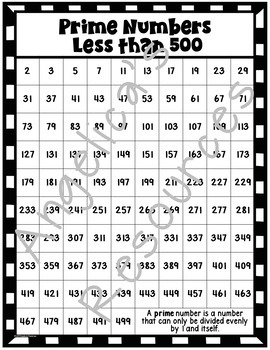
So, you see that 2 is a prime number as its factors are 1 and 2 and its prime factorisation will be 1 x 2. Through this table, we see that the numbers in red are our prime numbers.

So, now we will discuss the list of prime numbers from 1 to 100 to get a better understanding. The number of systems comprises of a lot of prime numbers. You know by now that prime numbers are ones having only two factors that are 1 and the number itself. This is because these numbers will always be having 5 as their factor. Further, if you have a number that has 2 or more digits and is ending with 5 or 0, it won’t be a prime number. Thus, 2 will be the only even Prime number. It also carries significance in maths and is referred to as the Fundamental Theorem of Arithmetic.Ī little trick to identify these numbers is that an even number that is greater than 2 is always going to be composite. Thus, if you pick any whole number, it will either be a prime number or you can build it by making use of a unique combination of prime numbers.

Any whole number is said to be either a prime number or we can build it by multiplication of unique combination of prime numbers. We can consider prime numbers as the building blocks of numbers. Further, number 13 will have only 2 factors which are 1 and 13 so it is a prime number.


As it has got more than 2 factors which are 1, 3, 5 and 15, it will be a composite number. It is because any whole number being greater than 1 will be prime or composite. Thus, you see that a composite number will be having more than 2 factors.įor instance, 1 will be neither be prime nor composite. On the other hand, any number which is greater than 1 and not a prime number will be a composite number. Similarly, if you cannot divide the number into equal groups, it is going to be a prime number. In other words, any whole number which is greater than 1 and is only divisible by 1 and itself will be referred to as a prime number.Īn easier way to understand this can be that if you can divide a number into equal groups, it won’t be a prime number. 3 List of Prime Numbers from 1 to 100 Definition of Prime NumbersĪny whole number which is greater than 1 having precisely two factors, 1 and itself, is certified as a prime number.


 0 kommentar(er)
0 kommentar(er)
